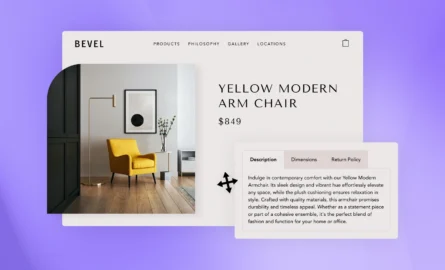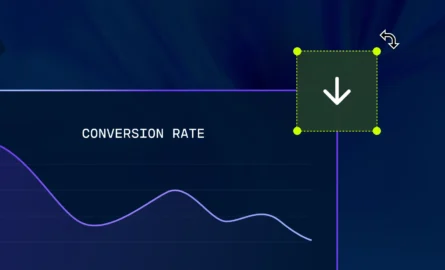8 of the Best B2B Ecommerce Platforms (and Criteria for Choosing Yours)
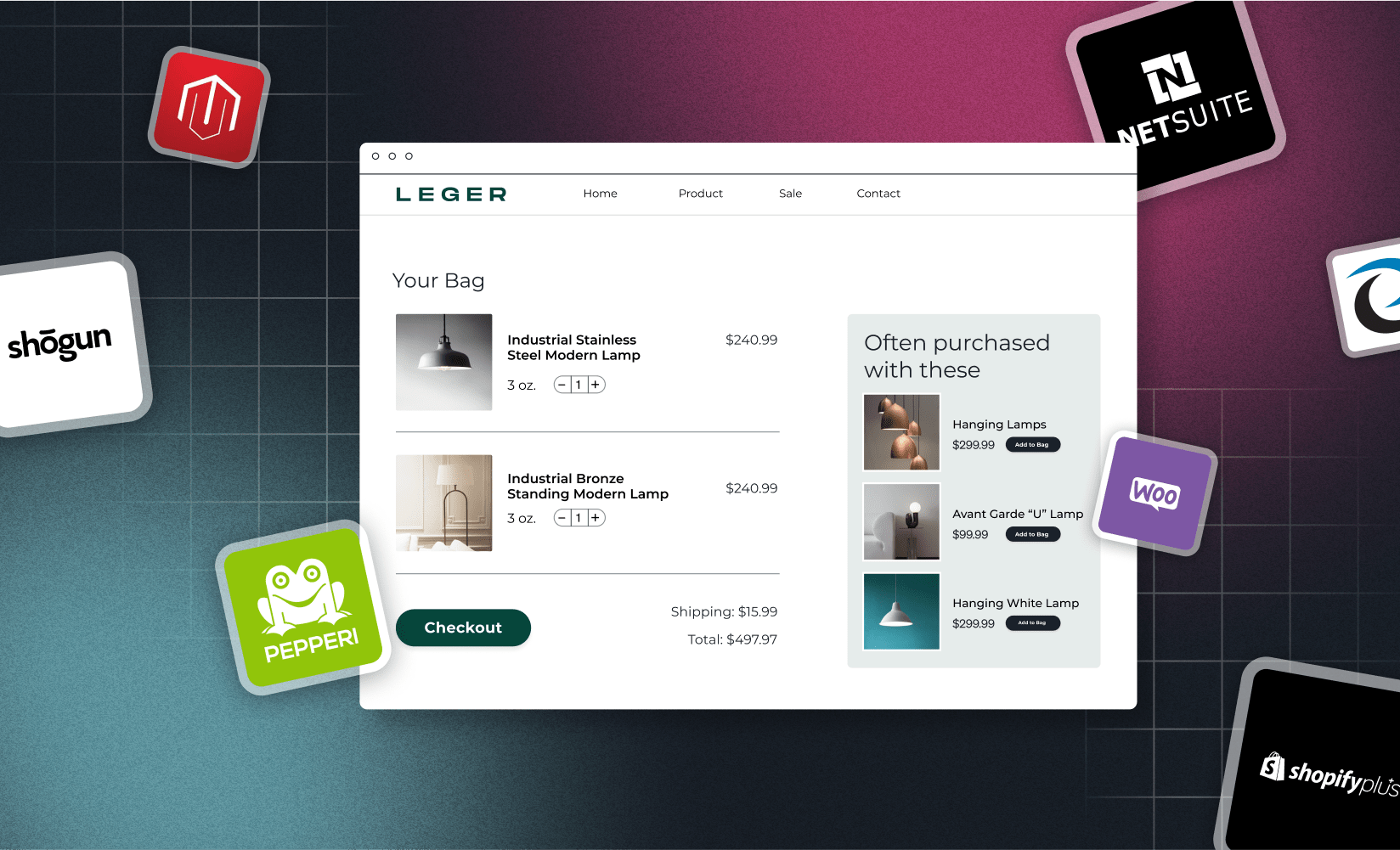
How B2B business is done has changed rapidly in the last few years. Sellers are seeking more efficient ways to interact with clients, and buyers have come to feel more at home online. Thanks to the growth of ecommerce generally, B2B buyers are now used to spending time immersed in digital. They feel comfortable using online portals, personalized digital accounts, and negotiating and completing large deals online.
With this growing familiarity comes an expectation for high-quality, personalized B2B experiences, similar to what B2C consumers expect.
So how can B2B companies scale growth while preserving and enhancing customer relationships?
Choosing the right ecommerce platform is a big part of this. And in the highly specialized world of B2B ecommerce, the services and functionality of the platform you choose are crucial.
If you need to streamline more of your B2B ecommerce operations—or are looking to expand—you’ll need to know the best B2B ecommerce platforms available, the key features to have on your shopping list, and the criteria for choosing the best option for your business.
Our rundown of the best platforms and top tips as you evaluate has you covered.
Here, we’ll look at:
- What is B2B ecommerce?
- What is a B2B ecommerce platform?
- The critical features your B2B ecommerce platform should have
- The top 8 B2B platforms
- Expert tips for making your B2B ecommerce platform selection
What is B2B ecommerce?
B2B ecommerce is online selling to another business rather than an independent consumer. B2B ecommerce differs from B2C in that your site visitors are acting on behalf of a business rather than as individual consumers.
This makes for a different approach to the customer journey: visitors often want to get to the product or service as quickly and efficiently as possible.
But B2B trends suggest they now (also) expect an excellent customer experience while doing so. Their expectations are learned from being B2C shoppers in their spare time.
#cta-visual-pb#<cta-title>Enable your whole team to start creating<cta-title>Designed for larger ecommerce teams, Shogun Page Builder Advanced gives you 10+ user seats with unique roles and permissions to scale your content creation efforts.Learn more
What is a B2B ecommerce platform?
While influenced by standards and web trends, B2B sellers have different requirements compared to B2C brands, so B2B ecommerce websites typically require unique features.
Among other things, they need to be able to:
- Provide special, restricted areas where customers can see the details of their account and quickly re-order stock as returning shoppers.
- Set custom pricing based on a range of customer details
- Offer flexible payment methods and options
These features of your B2B ecommerce portal or site need to be supported by a different set of ecommerce services or capabilities, which means you may likely require an ecommerce platform with services designed specifically for B2B.
The critical features your B2B ecommerce platform should have
As every B2B business is different, the features you’ll need won’t be the same for everyone.
In general, though, the key features you’ll likely need to look for in a B2B platform are:
Locked/restricted access areas
Business customers need their own client accounts where they can view and apply discounts and offers that are specific to them. An ecommerce platform for b2b needs to be able to support a secure, accurately updated, restricted area of your site for these buyers.
Dedicated customer portals
An efficient and intuitive b2b commerce portal, where customers can not only make repeat purchases but get customer service and support, adds considerably to the customer experience.
A common concern amongst B2B vendors is that self-service will mean their customers lose out on the personal touch via a portal, but these special areas are actually an opportunity to provide added value for B2B customers.
- Being able to see products, get quotes, and submit orders in a personalized area saves your customers time going back and forth over email or phone. Especially if there are specific deals or known specifications you can list in their client area from prior interactions, accessible as a customer record internally.
- You can also display personalized messaging and recommendations inside the portal, and provide 1.1 customer service chats. This helps to create a seamless customer journey and increases convenience. For custom messaging, consider whether there may be related best-selling merchandise you can prompt to a customer in their portal based on prior purchases.
Flexible pricing options
You need to be able to set prices depending on which client’s making the order, the size of their order, new or repeat orders, the buyer’s location, etc. Being able to do this and display related, localized costs will make your B2B buying journeys more efficient and provide easy-to-understand incentives for your customers. You’ll need a platform that facilitates this.
Flexible payment options
B2B customers don’t always pay up-front on their credit card. Offering invoicing, payment by purchase order, etc., gives your customers the flexibility they need. Often, B2B orders are significantly more expensive, so your compliance, checkout, and payment gateways are definitely something to consider for crafting a smooth experience.
Excellent security
Your clients will expect top-level security for B2B transactions and customer accounts. Ensure the platform you choose is PCI Level 1 compliant at minimum and offers you an SSL certificate.
Internationalization features
Not only do you need to be able to set and display prices in local currencies, you also need to make it easy for your customers to see a breakdown of their costs. Things like shipping and tax costs vary considerably from country to country, so internationalization features that allow you to display this information accurately within the customer portal is crucial if you’re serious about B2B selling.
The top 8 B2B ecommerce platforms
With so many backend solutions available, it can be hard to know how to choose a B2B ecommerce platform. Now you have some considerations to help you work out what you need as you evaluate, let’s look at the best B2B ecommerce solutions the market has to offer.
BigCommerce B2B Edition
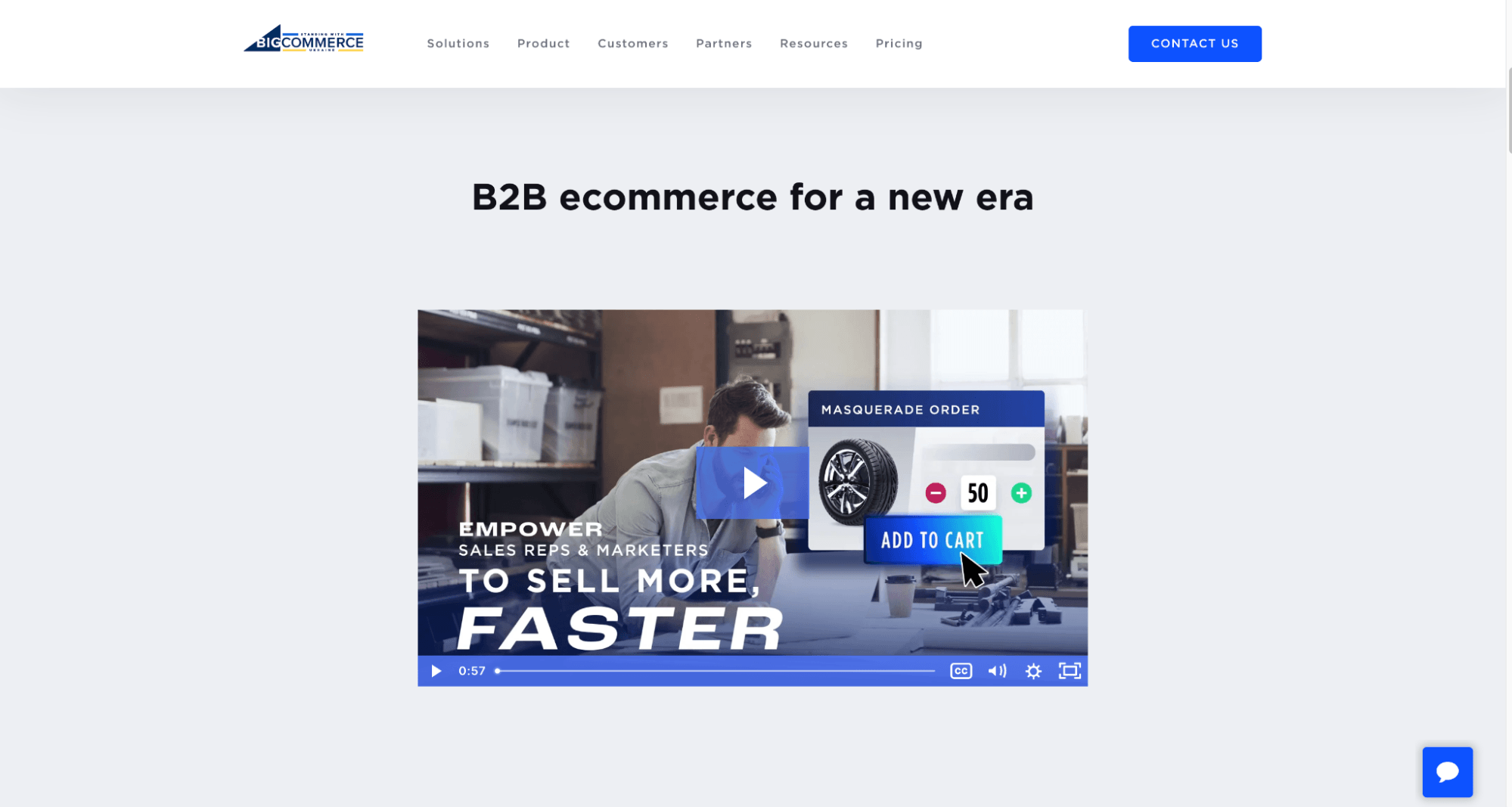
BigCommerce is one of the most popular B2C platforms, and it also offers a comprehensive B2B ecommerce package. Businesses selling to clients overseas will be particularly interested in its internationalization features, which help you tailor your buying experience.
BigCommerce supports over 100 currencies, plus integrations with several global shipping companies so you can display local tax and shipping info to customers directly on your site.
Pros
- Outstanding internationalization features – In addition to the above features, BigCommerce lets you use any language for your site, including on product pages.
- Wide range of integration capabilities out-of-the-box – You can get your other enterprise software—ERP, CRM, POS, etc.—hooked up quickly and easily.
- Eliminate silos between B2B and B2C – BIgCommerce B2B is built on top of their original B2C platform, which is great news for retailers who cover both. There’s no need to use separate platforms for the different parts of your business, saving huge amounts of time and resources on tracking stock levels, order management, etc.
Cons
- Only available on their enterprise plan – While BigCommerce offers competitive pricing for its B2C platform, merchants can only access the add-ons that make up the B2B version on an enterprise plan. This is a drawback for smaller B2B businesses.
- Relatively complex – BigCommerce has plenty of helpful services and integrations. However, the size and scale of what is a serious enterprise solution can be overwhelming for newbies. This, plus its pricing structure, makes it ideal for scaling online sellers, but not as suitable for small-scale brands.
Pricing
BigCommerce’s Enterprise pricing is negotiable depending on level of service and annual sales.
OroCommerce
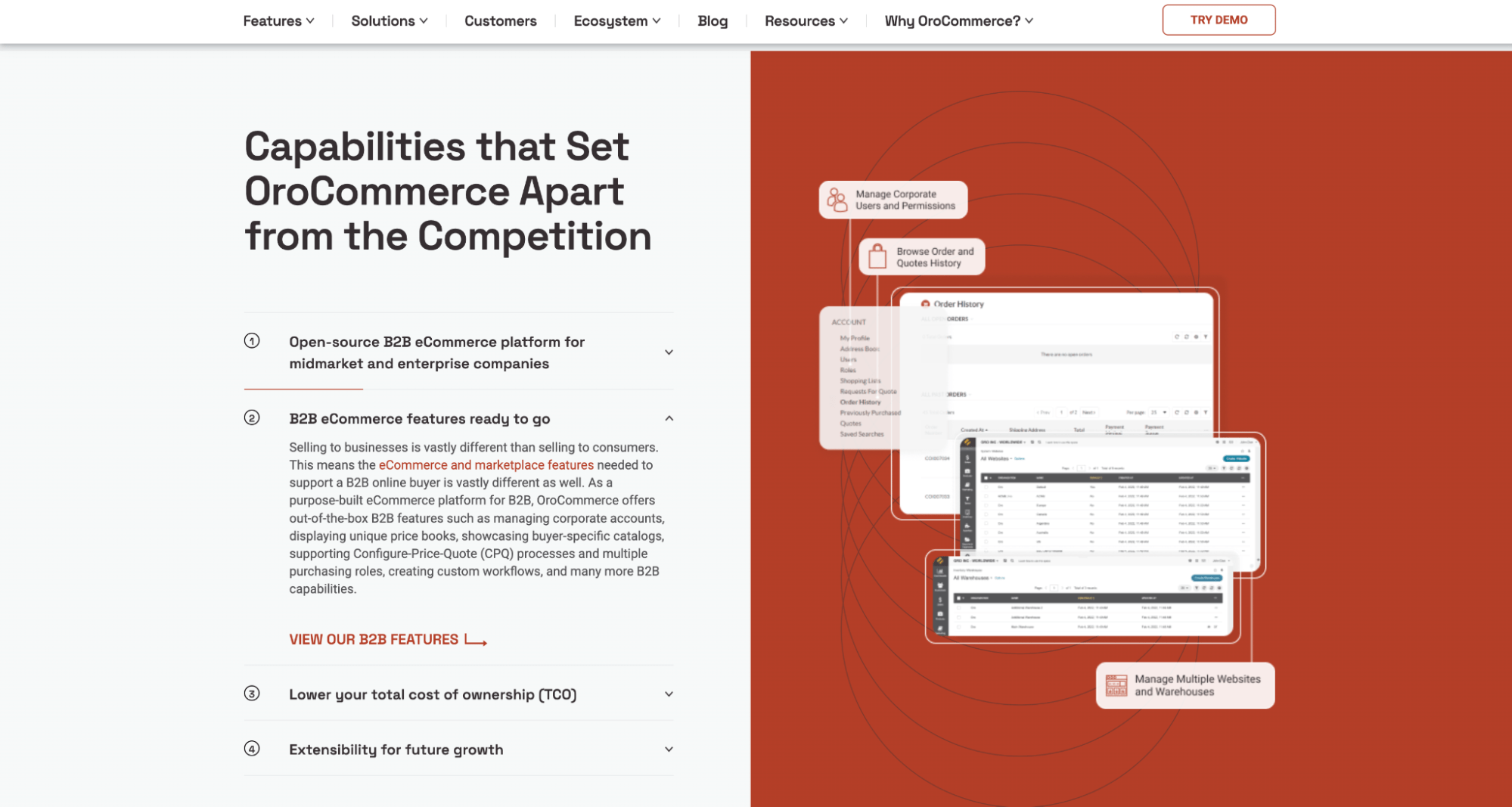
Unlike BigCommerce, OroCommerce was designed specifically for the B2B market. It offers all the B2B ecommerce features you would expect—dedicated customer accounts, customer-level pricing, etc.—with the capacity to handle large-scale B2B operations. It also comes with a B2C option so you can access and manage both parts of your business from the same platform.
Pros
- Services tailored to B2B merchants – OroCommerce is aimed at big online sellers. It provides a robust and broad range of B2B ecommerce services.
- Also a CRM – This one’s also a full-scale CRM platform, so you don’t have to worry about integration and can track your customers and manage your backend ecommerce services in one place.
- ERP integration – Gives you the ability to connect your ERP and automate several business processes.
Cons
- Technical set-up and management – You’ll need developer help to connect OroCommerce to your storefront. And, as this is a relatively new platform (launched in 2012) there aren’t as many experienced developers on hand as is the case for some more established players.
Pricing
OroCommerce Community, aimed at smaller businesses, is free. The Enterprise edition is priced on an individual basis.
Adobe Commerce/Magento
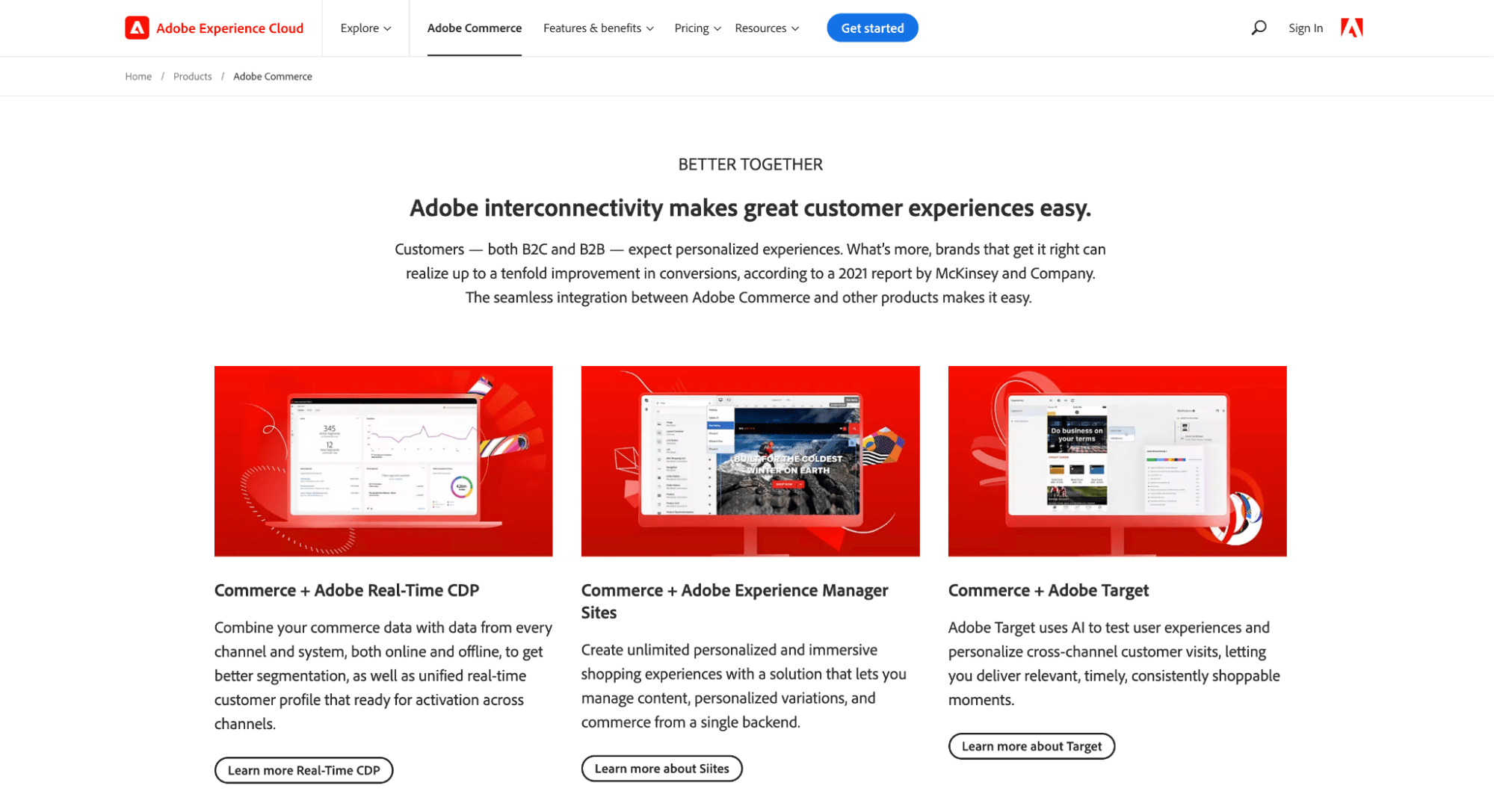
Adobe Commerce (still often called Magento) is a great all-rounder that offers B2B and B2C functionality within the same platform. Adobe has put personalization and the customer experience at the heart of its B2C platform, and they want to offer the same level of convenience and ease with its B2B services. They achieve this through a comprehensive range of customizable customer account settings and self-service tools.
Pros
- Personalization – Adobe’s Intuitive, easy-to-manage customer accounts, combined with personalized recommendations and messaging, are great ways to show your customers they’re valued. They allow you to create an online version of your individual office-based/real-world B2B relationships.
- Highly customizable – Set up your customer accounts with customized pricing and catalogs so they reflect individual deals and offers, and display the most relevant products.
- B2B and B2C platform – Adobe is an integrated B2B and B2C platform, easing your backend management and providing B2C-level cross-channel integration and UX to your B2B customers. You can avoid the silos!
Cons
- Cost – Adobe Commerce is priced on a customer-by-customer basis, and its price reflects its outstanding commerce functionality. There is a free version available, but you’ll still have to pay hosting and developer costs.
Pricing
Magento Open Source is still free and comes with basic ecommerce functionality. Adobe Commerce is priced depending on the level of service you need.
#cta-visual-pb#<cta-title>Enable your whole team to start creating<cta-title>Designed for larger ecommerce teams, Shogun Page Builder Advanced gives you 10+ user seats with unique roles and permissions to scale your content creation efforts.Learn more
WooCommerce B2B
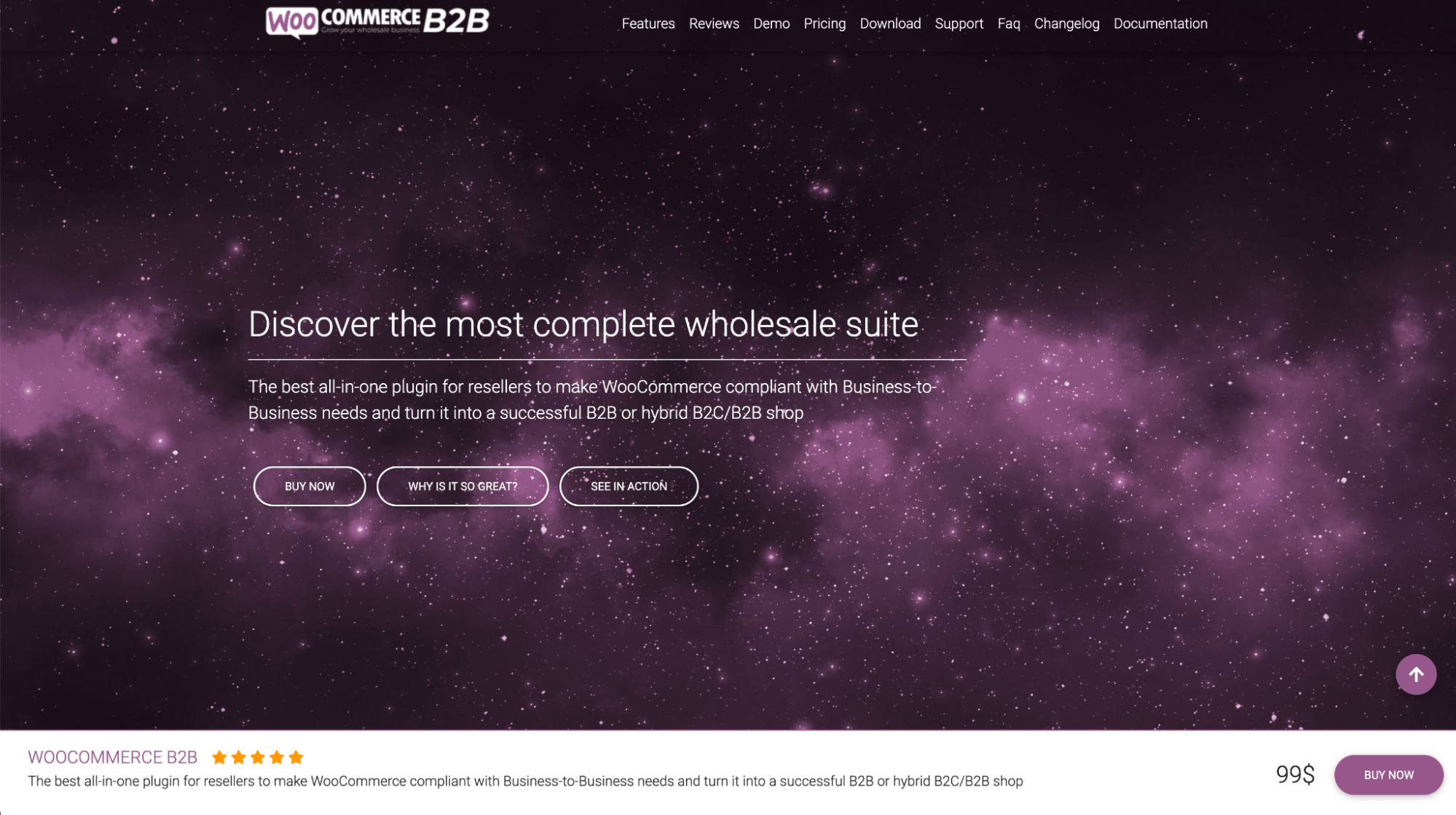
The open source ecommerce solution for WordPress has a B2B extension. This bundle of plugins provides extensive B2B functionality and gives WooCommerce users the ability to convert DTC online stores into B2B sites.
Pros
- Customer groups – Segment your customers and set separate rules, prices, and catalog visibility for different groups.
- Flexible payment options – Give customers the option of checking out with purchase order numbers, or payment by invoice.
- Extensive functionality for a low price – WooCommerce B2B gives small and even medium-sized merchants everything they need to get up and running as a B2B seller and, as a plugin for open-source software, is an inexpensive way to get started.
Cons
- Only available for WordPress sites – WooCommerce is specifically coded and designed for use on WordPress.
- Limited functionality – While WooCommerce B2B has the basics very well covered, advanced functionality like personalization and multi-channel integration are beyond the abilities of this plugin.
Pricing
$99
Shopify Plus
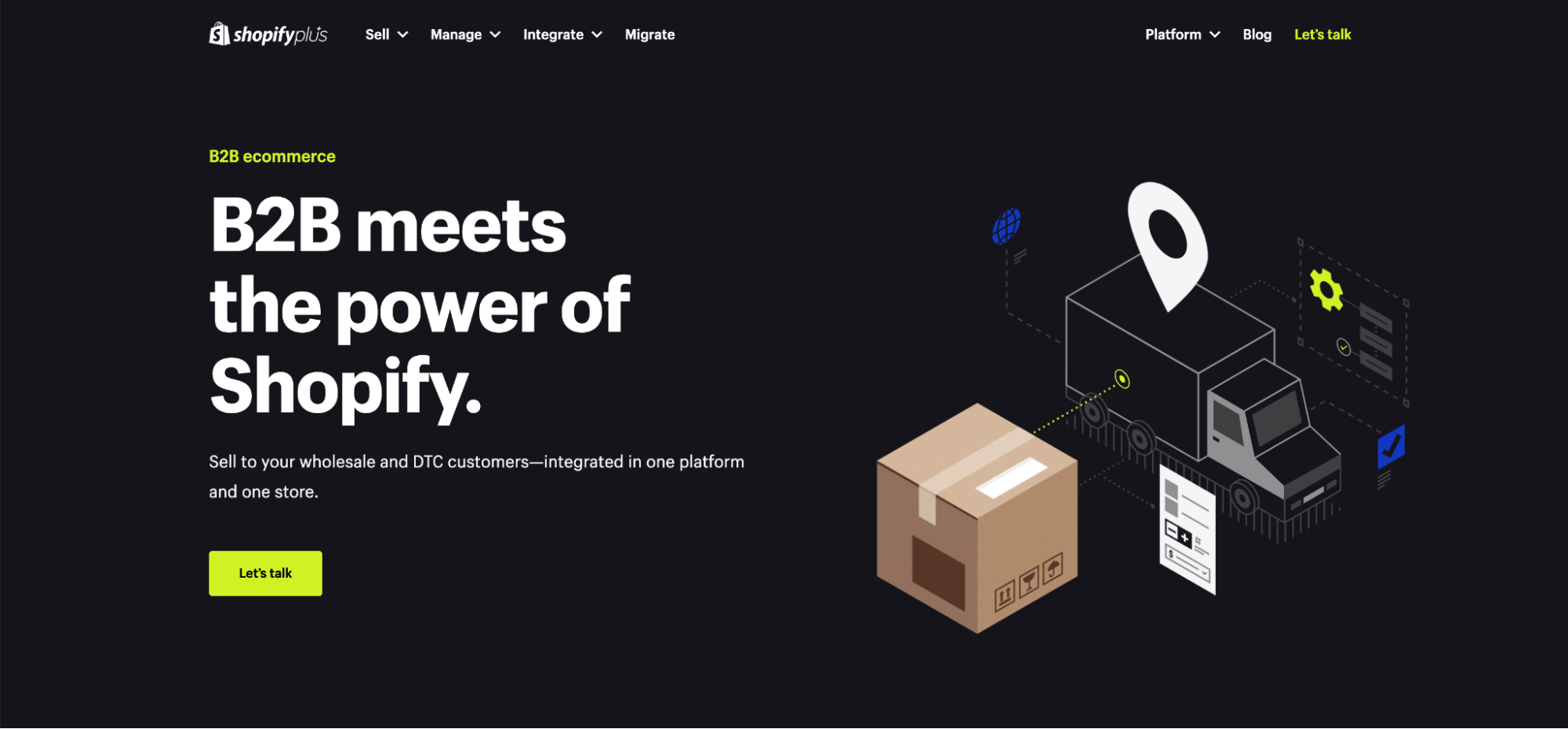
Shopify Plus, the enterprise version of Shopify, has the functionality to turn your DTC store into a wholesale or B2B site. Known as B2B on Shopify, and replacing their Wholesale Channel, it’s ideal for scaling brands already running their stores on Shopify and wanting to add more revenue streams.
In addition to enterprise-level B2B services, Shopify Plus gives you access to all the outstanding customer experience features that Shopify is famous for.
Pros
- Market-leading platform – Shopify is one of the most used and well-respected commerce platforms available.
- Advanced customer experience capabilities – B2B customers increasingly expect a buying experience on par with B2C. Shopify Plus lets you customize themes, set prices on a customer-by-customer basis, and offer automated checkout.
- B2B/B2C flexibility – You can choose to set up your B2B operation on your existing site or create a dedicated storefront.
Cons
- Only available as part of Shopify Plus – If you’re on one of the basic Shopify packages, you’ll have to upgrade.
- Cost – B2B on Shopify is part of their premium commerce service. You get extensive functionality, but it might be above the budgets of smaller sellers.
Pricing
Shopify Plus starts from $2,000 per month.
TrueCommerce Netalogue
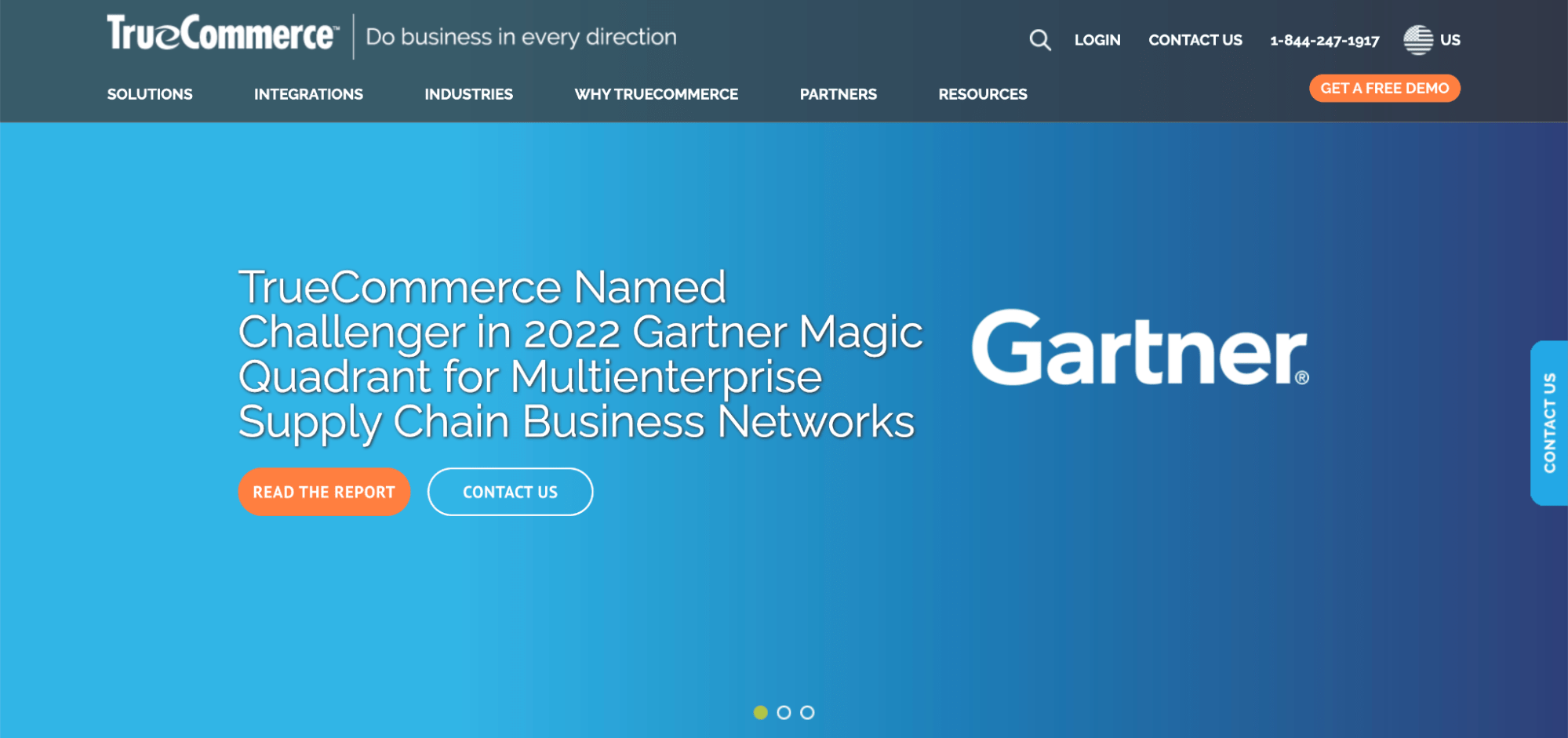
This platform is aimed squarely at the B2B ecommerce market. Its features are designed for larger merchants who need to offer flexible, personalized buying options to a large customer base.
TrueCommerce is famous for its pioneering EDI (Electronic Data Exchange) system, which facilitates document exchange between you and your customers on a standardized basis. It means sending of purchase orders, requests, invoices, etc. can be automated and streamlined.
Pros
- Personalized ordering portal – TrueCommerce offers highly flexible, customer specific pricing, personalized promotions and faceted search, meaning you can set up customer accounts to match their specific needs.
- Advanced integration – TrueCommerce offers comprehensive integration with your ERP and business systems.
- Works across verticals – The platform stands behind companies in several different industries, from brewers and pub chain Green King, to builders’ merchants Travis Perkins.
- EDI system – Leading EDI technology.
Cons
- B2B only – While TrueCommerce claims to bring the B2C experience to B2B online selling, this is a dedicated B2B solution. If you have a B2C business too, you won’t be able to run both your stores from the same backend.
Pricing
Pricing is available on request.
SuiteCommerce by Oracle

Oracle NetSuite is a cloud-based ERP solution that also offers ecommerce services in the form of SuitCommerce, a commerce platform that serves B2B and B2C. As they’re primarily an ERP, the native integration of your business systems is a big plus point for B2B merchants.
Pros
- Single view of data – Netsuite pools data from the ERP, commerce platform, customer services, and other areas to provide a single view of your online business, from inventory management to customer journeys.
- Omnichannel – B2B and B2C customers can use a full range of touchpoints, all supported from a single backend.
Cons
- Lack of integration with third parties – While the integrations with Netsuite’s other business solutions are very good, there’s limited scope for integrating third-party services.
- Only available with NetSuite ERP – If you’re already using NetSuite as your ERP, or you’re considering switching, the prospect of native integration with ecommerce services may well be worth it. If you’re happy with your existing ERP, you might find yourself signing up for a lot of functionality you don’t need in order to get access.
Pricing
Available on request.
Pepperi
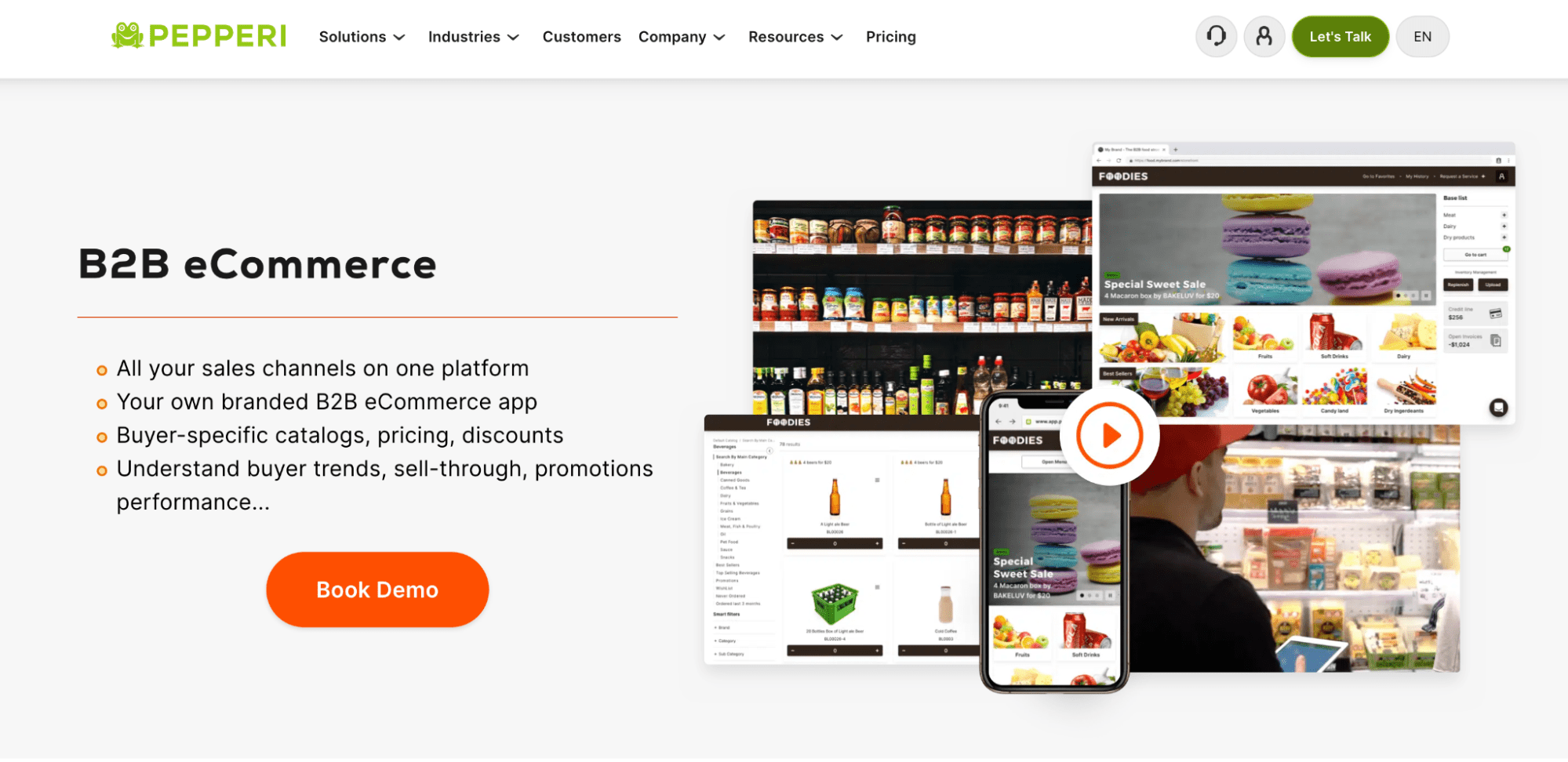
Pepperi is a dedicated B2B platform that specializes in providing an outstanding customer interface. Its easy-to-use self-service portal is highly customizable, so you can build intuitive customer journeys, on mobile and desktop.
Pros
- Designed with the B2B customer in mind – Offer your customers an Intuitive, customizable, and flexible online buying experience.
- Omnichannel – Pepperi is optimized for mobile, and integrates sales channels into a single backend location.
- Excellent integration capabilities – Connect quickly to ERP systems and other parts of your tech stack.
Cons
- Not entry-level – Pepperi is a fantastic platform but its cost makes it unsuitable for those just starting out.
- B2B only – There is no B2C aspect, so you won’t be able to run that side of your business with Pepperi.
Pricing
Starts at $500 per month.
Expert tips for making your B2B ecommerce platform selection
So now that you’ve got a shortlist to consider, how should you go about picking your platform? Our expert tips are here to help you narrow things down!
1. Focus on the customer experience above all else
As B2B buyers exist in the same world as the rest of us, they are coming to expect the same level of digital experience as B2C. Personalized customer journeys and rich digital experiences are becoming increasingly important in B2B ecommerce. Ensure the platform you choose will help you facilitate especially modern experiences, considering store navigation, look and feel, and ease of ordering.
2. The more pricing options for buyers, the better
When choosing your platform, pay attention to pricing features. You need to be able to set account-level pricing and accommodate bulk orders, volume pricing, and minimum/maximum thresholds. These are often table stakes for B2B as you scale.
3. Choose a customizable platform
In addition to customizing price lists and self-service portals, you may well need functionality that’s unique to your business and that your commerce platform provider will have to work with you to develop.
Make a note of all the specialist features your business needs. I.e.. If you’re a technology company, do you need to be able to display compatible products/services on your product page? Do you need to display discount pricing at checkout? Your custom data sets will be a factor in how much you need to change out-of-the-box per platform.
4. Choose a platform that integrates with the rest of your core tech stack
For B2B customers, a platform that can be linked to your ERP is particularly important.
5. Consider your B2C business (silos are tough to manage!)
If you have a B2C business too, you’ll need to know how it will work alongside your B2B operation. Having a platform that can run both B2B and B2C, either with separate sites or separate sections of a site, works best for many brands. You may want consumers encountering the site in a way that feels separate, but your ecommerce team may want a way to manage content such that everything’s together or running on the same CMS setup.
6. Think about your teams and company-wide adoption
Similar to that last point, it’s not just your customers who will benefit; your teams will enjoy using a platform that’s intuitive, easy to make changes on, and can have new channels and features added to it quickly. Consult review sites and get a sense for how implementation and post-implementation has gone for real B2B brands using the platforms.
Create the B2B website your customers deserve
There are many different platforms you can use to deliver your B2B ecommerce services.
The choice you make will come down to the unique needs of your business: Which platform is customizable enough to meet your business objectives while providing a flexible, fast, and convenient customer experience?
But whichever choice you make to power your backend business operations, you may want to consider a frontend layer to match the exceptional digital experience you set up.
#cta-visual-pb#<cta-title>Enable your whole team to start creating<cta-title>Designed for larger ecommerce teams, Shogun Page Builder Advanced gives you 10+ user seats with unique roles and permissions to scale your content creation efforts.Learn more

Rhys Williams
Rhys is a writer specializing in enterprise software, ecommerce, and SaaS. He describes himself as a geek and a wordsmith and relishes making complex, technical topics come to life in easy-to-understand web copy.

